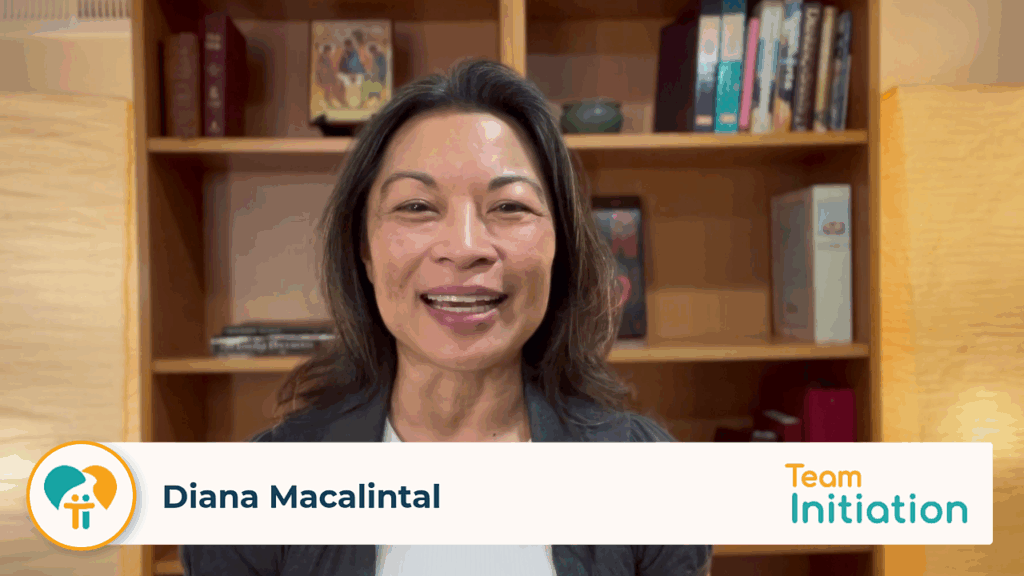In a previous article, we noted that what it means to be a “good Catholic” has changed. One clear marker of that change is the call to return to our roots from the early church and embrace a synodal way of living. In this article, I want to explore how we might apply the principles of synodality to conflicts we might experience in the catechumenate process.
Conflicts in the catechumenate process
Have you ever encountered conflicts such as a pastor refusing to dismiss the catechumens after the homily or team members insisting on rigid timelines for initiation? Perhaps you’ve experienced a lack of differentiation between unbaptized and baptized individuals in the process or a teaching program that fails to engage and foster conversion.
You may be experienced like these or other similar examples. Conflicts can arise from differing perspectives on the initiation process, teaching methods, or the role of baptized and unbaptized seekers in the process.
Conflict is a natural and human phenomenon, and it is impossible to completely avoid it. However, conflicts, in and of themselves, are not necessarily negative. In fact, they can serve as opportunities for growth and learning. It is crucial to address conflicts promptly and constructively, as unresolved conflicts can have a detrimental impact on the ministry.
Unique nature of conflicts with pastors
Conflicts with pastors can often carry an extra weight due to a perceived power imbalance. When we disagree with our pastor, we may feel underappreciated, constrained, undervalued, or denied the necessary resources for our ministry. It is essential to recognize these emotions and engage in open dialogue with pastors while keeping the gospel mission at the forefront of our conversations.
Understanding synodality
Synodality represents the style and essence of the church, emphasizing the communal journey of the People of God. The preparatory document for the 2020-2023 Synod on Synodality says:
In this sense, synodality enables the entire People of God to walk forward together, listening to the Holy Spirit and the Word of God, to participate in the mission of the Church in the communion that Christ establishes between us.
Official Handbook for Listening and Discernment in Local Churches: For the Synod on Synodality
Pope Francis highlighted the importance of synodality when he said, “It is precisely this path of synodality which God expects of the Church of the third millennium” (Address for the ceremony commemorating the 50th anniversary of the institution of the Synod of Bishops, 17 October 2015).
When conflicts arise, embracing synodality helps us discern the Spirit’s guidance and encourages authentic listening and dialogue.
When conflicts arise, embracing synodality helps us discern the Spirit’s guidance and encourages authentic listening and dialogue.
Baptism empowers us for synodal life
The church teaches that the entire People of God shares a common dignity and vocation through baptism. As members of the baptismal priesthood, we are empowered to proclaim the gospel and advance the mission of the church. This active participation in the church’s life is exactly what we are apprenticing the catechumens and candidates to do.
Authentic listening is the first step in living synodally. It requires an open mind and heart, devoid of prejudices. We must listen to the voices of young people, women, minorities, and the marginalized, identifying and overcoming the barriers that hinder our listening.
Pope Francis teaches:
We need to practice the art of listening, which is more than simply hearing. Listening, in communication, is an openness of heart which makes possible that closeness without which genuine spiritual encounter cannot occur. Listening helps us to find the right gesture and word which shows that we are more than simply bystanders. Only through such respectful and compassionate listening can we enter on the paths of true growth and awaken a yearning for the Christian ideal: the desire to respond fully to God’s love and to bring to fruition what he has sown in our lives.
Joy of the Gospel, 171
Forming catechumens for synodal living
To enable catechumens and candidates to walk together and embody synodality, we must prepare them to embrace change, listen to one another, engage in dialogue, and navigate moments of disagreement. By fostering these skills, we create an inclusive, participatory community where diverse gifts and charisms are valued.
By practicing synodal living in times of conflict, we witness the guidance of the Holy Spirit in the Church’s journey. We build an inclusive community where everyone contributes to the People of God’s growth, recognizing the value of diverse gifts. Synodal living empowers us to proclaim the gospel, address prejudice, and establish the Church as an agent of dialogue, reconciliation, and inclusion.
Conflicts are an inevitable part of the catechumenate process, but they need not be detrimental to our ministry. Through synodal living and authentic listening, we can transform conflicts into opportunities for growth.
Can you help me out?
I’d love to know how this is landing. Can you share a word or a phrase about how this article resonates with you? Does it speak to your experience? Share your thoughts in the comments box below. Thanks for being part of the conversion!

















Great stuff, Nick. Thanks for all your hard work and insightful words.
Thanks Mark! I’m glad it was helpful. Blessings.
Thanks for sharing your insights and wisdom!
Thanks Debra! I appreciate the support. Have a great day.
Yes it speaks to my experience. Our priests and parishioners need education on the Pope’s dream and what it means to be synodal people .
Thanks Nora! I am grateful you took time to comment. Blessings.
Frankly, I feel that your definition of synodality is not definitive. Unbaptized persons, especially, need a definitive explanation of who we are, what we do, and how we are called to act as Catholic Christians in our world today. Words like “inclusive” make me uneasy because those words could imply that we are a “free-wheeling,” anything goes type of community. And that is exactly what we are NOT. We need to teach that we follow Scripture, Tradition with a capital “T”, and the Magisterium of the Catholic Church.
Yes, everyone’s opinion should be heard, but an opinion is just that; an opinion. And people’s opinions are not what guide the living of our Catholic faith.
Hi Juliann.
Thank you for sharing your comment. I would like to provide some clarification regarding the understanding of synodality that I mentioned earlier. It is important to note that this understanding is not my personal interpretation but rather the teaching of the church. To support this, I would like to refer you to the Vademecum for the Synod on Synodality (Official Handbook for Listening and Discernment in Local Churches).
The handbook emphasizes the significance of synods as a time to dream:
Furthermore, the handbook identifies participation as one of the key themes of the synodal process.
Even catechumens, though unbaptized, are considered members of the household of God when they are consecrated as catechumens (see RCIA 47). Therefore, they should be included in the synodal process.
The handbook also emphasizes the need to listen to those who are outside the church.
It is crucial to note that listening to and dialoguing with one another does not imply a freewheeling or anything-goes approach. Rather, it represents a return to the inclusive character and roots of the church from its inception. In describing the synodal nature of the church, the handbook says:
If we are to provide catechumens with a definitive explanation of who we are, what we do, and how we are called to act as Catholic Christians in our world today, we must first teach them the importance of listening to and engaging in dialogue with everyone they encounter. The handbook underscores this point.
Thus, the emphasis on listening, dialogue, and inclusivity in the synodal process is not an endorsement of a freewheeling approach, but rather a return to the fundamental principles and values that have shaped the Church from its earliest days.
In conclusion, the synodal nature of the Church invites us to engage in a process of deep listening, respectful dialogue, and active participation. It is through this synodal approach that we can build a community that is united, inclusive, and responsive to the diverse needs of our world.
Read a lot on synodality but somehow it is a missing term in our parish or may just be only in an inclusive circle.
Hi Cora.
The great thing about the practice of synodality is that you can influence your parish with community building and listening behaviors even if the parish leadership may not be actively doing so. Here are a few things you can do:
Engage in open dialogue: Express your thoughts and ideas frequently but respectfully with the parish leadership. This can be during parish meetings, through written communication, or by reaching out to them personally. Share your perspective and encourage them to consider different viewpoints.
Participate in parish activities: Attend parish gatherings, events, and discussions where you can meet other parishioners. By actively participating, you can engage in conversations and share your thoughts and concerns. This helps create an atmosphere of collaboration and encourages others to do the same.
Form or join groups: Seek out or create small groups within the parish that focus on specific topics or issues of importance. These groups can provide a space for open dialogue and collaboration among like-minded individuals who share similar concerns. By coming together, you can discuss ideas and propose suggestions to the parish leadership.
Offer constructive suggestions: If you have specific ideas or proposals, write them down and present them to the parish leadership. Be constructive in your suggestions and offer potential solutions to the challenges or issues at hand. Encourage the leadership to consider implementing a more inclusive and participatory approach.
Pray for the church: Lift up prayers for the church, its leaders, and the entire community. Pray that the spirit of synodality and open dialogue permeates the parish, guiding the leadership towards a more inclusive and collaborative approach. Praying for unity, understanding, and God’s guidance can have a positive impact on the overall dynamics of the parish.
Your individual efforts may not immediately change your parish’s approach, but you can contribute to a culture of open communication and encourage others to participate and engage. Your efforts can help foster an environment where the principles of synodality are embraced and valued.
Thank you for your dedication and commitment.
Nick
It is incredibly difficult to bring people to where they can embrace the catechumenal process; I have been so changed by it over the decades that I yearn to share it with everyone! I really wish our pastors would open themselves to the experiences of their brother priests and the many of us who have witnessed the movement of the Spirit transforming parishes in this process.